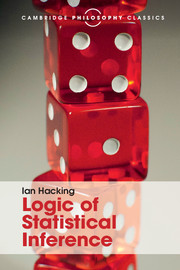Book contents
13 - The subjective theory
Published online by Cambridge University Press: 05 July 2016
Summary
The subjective theory of statistical inference descends from Bayes; its immediate progenitors are Ramsey and de Finetti; Savage is its most recent distinguished patron. It aims at analysing rational, or at least consistent, procedures for choosing among statistical hypotheses. In some ways reaching further than our theory of support, it is in a correspondingly less stable state. But the two theories are compatible. Some tenets of subjectivists conflict with the theory of support, but do not seem essential to subjectivism. Both theories combine elements of caution and ambition, but where one is bold, the other is wary. The present chapter will not contribute to the subjective theory, but will try to distinguish its province from the theory of statistical support.
The two theories
As presented in this book the theory of support analyses only inferences between joint propositions; essentially, inferences from statistical data either to statistical hypotheses, or else to predictions about the outcomes of particular trials. It attempts a rather precise analysis of these inferences, and in so doing is perhaps too audacious, but at least it proffers postulates rich enough in consequences that they can be tested and, one hopes, revised in the light of counterexamples. But in another respect the theory is timid, for it gives no account of how to establish statistical data. Thus although it may claim to encompass all that is precisely analysable in statistical inference, it cannot pretend to cover all the intellectual moves made by statisticians. It would defend itself against criticism on this score by maintaining that the way in which statistical data are agreed on—partly by experiment, partly by half-arbitrary, half-judicious simplification—is not peculiar to statistics and so should not seek an especially statistical foundation.
But the subjective theory embraces all work done in statistics, and perhaps all inductive reasoning in any field. At the same time it hesitates to appraise inferences made on the basis of particular statistical data. It is concerned only that inferences be consistent with each other. The theory's key concept has been variously called ‘subjective probability’, ‘personal probability’, ‘intuitive probability’, ‘probability’ and ‘personal betting rate’.
- Type
- Chapter
- Information
- Logic of Statistical Inference , pp. 192 - 210Publisher: Cambridge University PressPrint publication year: 2016



